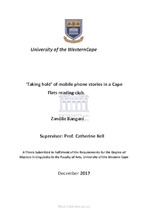‘Taking hold’ of mobile phone stories in a Cape Flats reading club
Abstract
This ethnographically-orientated intervention explored how members of a Cape Flats reading
club “took hold” (Street, 2009) of digital literacy in their engagement with online fictional
stories accessed by a mobile phone. The Masifunde reading club takes place inside the premises
of a church located in one of the most impoverished and resource-constrained communities on
the outskirts of Cape Town. The club is connected to a bigger sets of clubs under the Nal’ibali
reading-for-enjoyment campaign seeking to create nurturing spaces for learning by introducing
children to literacy through story-telling. I wanted to diversify and increase the literacy material
available by introducing mobile phones to the club.
This research paper is theoretically grounded in the New Literacy Studies (NLS) framework
which argues that the social turn and digital turn to literacy have transformed literacy. I adopted
an ethnographic approach to literacy in order to understand how mobile reading is ‘taken hold’
of within an already established activities of the club which are conceptualized using
Goffman’s (1983) “interaction order”. Goffman’s (1983) “interaction order” was used to map
the established print-based interaction order and then to examine the practices of reading online
fiction and the materiality of the mobile phone as taken hold of within this interaction order.
The notion of ‘taking hold’ of was further extended to reveal the ways in which mobile stories
were resemiotized in the shared practices of the club members. The introduction of mobile
phones is viewed within Prinsloo’s (2005) “placed resources” concept that pays attention to the
specificity of the context in how the phone was taken hold of. What is more, through Goffman’s
(1956) back stage and front stage concept, I was able to trace using Ker’s (2005) “text-chain”
concept, how interactions in the back region WhatsApp group chat moved across space-time
to the front stage interactions in the Saturday club event. This revealed the ways in which the
uses and valuing of the phone changed across these spaces, with the phone being naturalised in
the back stage, but being treated as a difficult object in the front stage sessions by the
volunteers, while the children took up the phones in easy ways consistent with the existing
interaction order and therefore as placed resources. The study reveals that triumphalist claims
about uptake of digital technologies in resource-poor contexts and dismal internet connectivity
need to be treated with caution.

